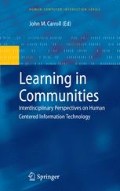Abstract
For the past decade, committed researchers, politicians, policy makers, investors, and community-based organizations made concerted efforts to redress the digital divide, but the solution has remained somewhat elusive. Information and communication technologies (ICTs) have been portrayed in digital divide discourses as the great equalizer that may be leveraged by local communities to combat economic deprivation and foster social inclusion.
Access this chapter
Tax calculation will be finalised at checkout
Purchases are for personal use only
References
Bourdieu, P. (1984). Distinction: A social critique of the judgement of taste. Cambridge, MA: Harvard University Press.
Bowles, S., & Gintis, H. (1976). Schooling in capitalist America: Educational reform and contradictions of economic life. New York: Basic Books.
Freire, P. (1970). Pedagogy of the oppressed, New York: Continuum International Publishing Group.
Giroux, H. (1983). Theory and resistance in education: A pedagogy for the opposition. New York: Bergin and Garvey.
Hooks, B. (2000). Feminist theory: From margin to center. Cambridge: South End Books.
Kvasny, L. (2005). The role of the habitus in shaping discourses about the digital divide. Journal of Computer Mediated Communication, 10(2). Available at http://jcmc.indiana.edu/vol10/issue2/kvasny.html; last accessed April 2005.
Kvasny, L. (2006). The cultural (re)production of digital inequality. Information, Communication and Society, 9(2), 160–181.
Kvasny, L., & Keil, M. (2006). The challenges of redressing the digital divide: A tale of two US cities. Information Systems Journal, 16(1), 23–53.
Willis, P. (1997). Learning to labor: How working-class kids get working-class jobs. Farnborough: Saxon House.
Editor information
Editors and Affiliations
Rights and permissions
Copyright information
© 2009 Springer-Verlag London Limited
About this chapter
Cite this chapter
Kvasny, L. (2009). Social Reproduction and Its Applicability for Community Informatics. In: Carroll, J.M. (eds) Learning in Communities. Human-Computer Interaction Series. Springer, London. https://doi.org/10.1007/978-1-84800-332-3_8
Download citation
DOI: https://doi.org/10.1007/978-1-84800-332-3_8
Publisher Name: Springer, London
Print ISBN: 978-1-84800-331-6
Online ISBN: 978-1-84800-332-3
eBook Packages: Computer ScienceComputer Science (R0)

